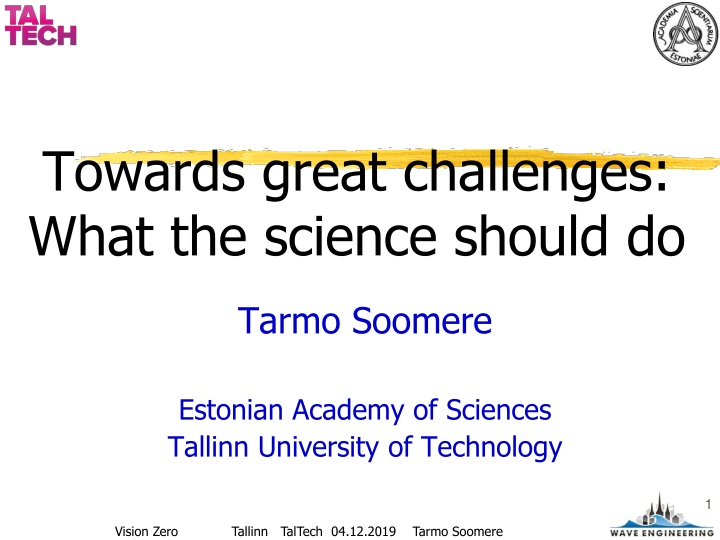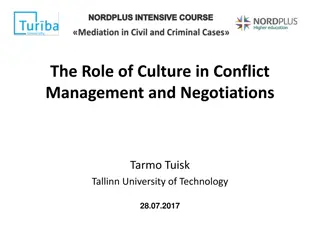
Facing Challenges of Modern Science: Insights from Tarmo Soomere
Explore the evolving role of science in our society with Tarmo Soomere, focusing on issues such as the meaning of science, reliable information, publication and communication, and the consequences and conjectures of having science. Gain perspectives on the power of intelligence and social maturity in navigating the complexities of contemporary scientific endeavors.
Download Presentation

Please find below an Image/Link to download the presentation.
The content on the website is provided AS IS for your information and personal use only. It may not be sold, licensed, or shared on other websites without obtaining consent from the author. If you encounter any issues during the download, it is possible that the publisher has removed the file from their server.
You are allowed to download the files provided on this website for personal or commercial use, subject to the condition that they are used lawfully. All files are the property of their respective owners.
The content on the website is provided AS IS for your information and personal use only. It may not be sold, licensed, or shared on other websites without obtaining consent from the author.
E N D
Presentation Transcript
Towards great challenges: What the science should do Tarmo Soomere Estonian Academy of Sciences Tallinn University of Technology 1 Vision Zero Tallinn TalTech 04.12.2019 Tarmo Soomere
A long introduction The meaning of science: to explain who we are (and then it s possible to steer our lives in contemporary society) Vision Zero Tallinn TalTech 04.12.2019 Tarmo Soomere
Winds of change Hope in the recent past: We shall enter into a new brave world of information Recognised now by many: It turned out to be a world of noise, legends and memes with possibly biased filters Search for reliable information Many scientists do it Others hope that at least scientists do so Proper interpretation and wider context becoming increasingly important 3 Vision Zero Tallinn TalTech 04.12.2019 Tarmo Soomere
Science, publication, communication Science (scientia = knowledge) a systematic enterprise that builds and organizes knowledge in the form of testable explanations and predictions (Wikipedia) Aristotle: the body of reliable knowledge, of the type that can be logically and rationally explained Modern use: a way of pursuing knowledge, not the knowledge itself. A scientific method seeks to explain the events of nature in a reproducible way Scientific journals communicate and document the results of research Presentations (both scientific and public): rapid way of communication 4 Vision Zero Tallinn TalTech 04.12.2019 Tarmo Soomere
Consequences of having science Changes in the meaning and content who we are Changes in what is fantasy and where are facts Cracking the DNA code: home of billions of aliens Scientism: Ignoring other values than scientific ones You cannot manage what you don t measure??? Could we rely on increasing IQ? Vision Zero Tallinn TalTech 04.12.2019 Tarmo Soomere
Conjectures from having science Re-thinking of homo socius The power of being intelligent The use of this power A must: efficient and long memory Equivalently: social maturity Two pillars of success in science Excellent knowledge of the state-of-the-art A chain linking the wisdom from the past Vision Zero Tallinn TalTech 04.12.2019 Tarmo Soomere
Part I Implementation of the theory of communication (of science) Tailored for classic means of communication of science A theory [message, .] may be: Correct Wrong Irrelevant (Unknown mathematician) Vision Zero Tallinn TalTech 04.12.2019 Tarmo Soomere
A good example of simple & winning theory: the three core priorities of real estate 1. The location 2. The location 3. The location Almost all other features are secondary The meaning of perfect location a function of time 8 Vision Zero Tallinn TalTech 04.12.2019 Tarmo Soomere
Implementation for communication of science 1. The content 2. The content (good science) (put into a wider context) 3. The content (shown how it changes the world) NB! The world of the audience not your world! Nobody in the audience cares about science 9 Vision Zero Tallinn TalTech 04.12.2019 Tarmo Soomere
Statistics of this implementation Ignored amazingly often in conference presentations Before I speak/write, I have something important to say. - Groucho Marx Ignored annoyingly often in presentations to public What I speak/write has to reach the audience Ignored almost totally It is the responsibility of the speaker/writer that what he/she speaks/writes actually reaches the audience What really matters: whether or not you reach the audience And the audience is smarter than we can imagine 10
Corollary 1 Good science is a necessary precondition of a good (science-conference) presentation But not sufficient for a good presentation to public There MUST be something more a message changing the world a broad view on things ability to deliver the message 11 Vision Zero Tallinn TalTech 04.12.2019 Tarmo Soomere
Corollary 2 (frustrating statistics) PhD students & post-docs Have to extensively train for each conference presentation normally no chance to deliver a good talk to the public unless severely trained & the presentation polished by the seniors and not every PhD student has such a senior around Senior scientists Usually provide perfect conference presentations Not trained for public presentations Annoyingly often think they can speak to the public But only ~1/4 of them have at least limited success 12 Vision Zero Tallinn TalTech 04.12.2019 Tarmo Soomere
The classic example about the importance of content "Colorless green ideas sleep furiously" An example of a sentence that is: grammatically correct, semantically nonsensical = no obvious understandable meaning can be derived from it Noam Chomsky, Logical Structures of Linguistic Theory (thesis, 1955), Three Models for the Description of Language (1956), Syntactic Structures (1957) Vision Zero Tallinn TalTech 04.12.2019 Tarmo Soomere
Corollary 3 An explanation why some speakers do not take questions 14 Vision Zero Tallinn TalTech 04.12.2019 Tarmo Soomere
A more diplomatic question that is often relevant 15
Part II: Out of ivory tower (The principles of communication by world-class scientists) The real questions to ask and answer: What society would like to ask? What society already knows (even if it is wrong)? What society thinks it knows? What society would do with the (correct) answer? Prof. Hans von Storch, 1st Baltic Earth Conference, Nida, 15.06.2016 Vision Zero Tallinn TalTech 04.12.2019 Tarmo Soomere
The challenge: breaking the trend 17 Vision Zero Tallinn TalTech 04.12.2019 Tarmo Soomere
The situation Decision-making: facts uncertain values in dispute stakes high decisions urgent Science: abundance of evidence, experience and wisdom Interface UN: Oceans and the law of the sea 12.06.2019 Tarmo Soomere
Handling facts: Too many? Or different? In the past: Few facts Comparison straightforward Now: Complex systems Self-organisation Uncertainties may increase exponentially Wicked problems 19 Vision Zero Tallinn TalTech 04.12.2019 Tarmo Soomere
Post-truth Michael Deacon (The Daily Telegraph, 09.06.2016) Facts are negative pessimistic unpatriotic Typical for: environmental problems & social & societal issues 20 Vision Zero Tallinn TalTech 04.12.2019 Tarmo Soomere
Post-normal facts [are] uncertain values in dispute stakes high decisions urgent Large Strategic decisions Uncertainties and risks 1990s by Silvio Funtowicz and Jerome R. Ravetz. Expensive applications Classic sciences Stakes Small High Low 21 Vision Zero Tallinn TalTech 04.12.2019 Tarmo Soomere
New trend: silent facts Speechless == out of context Easy to misinterpret Flat earth, MMS, anti-vaccination The problem of overall bias Minimum information about failures Publication of only positive results Somebody has to speak using facts and for facts Occupy social media? 22 Vision Zero Tallinn TalTech 04.12.2019 Tarmo Soomere
The idea: Talking to each other How could the explosively growing pool of scientific knowledge be better used for the benefit of society? How can we drive science to meet policy? How different are the languages and formats used by scientists and policy-makers? Where are the bottlenecks? What are the rules that govern science advice? How complicated or simplified should it be? How do we avoid failures, mistrust and misinterpretations? Who should talk and to whom? How do we build up a sustainable advice mechanism? Vision Zero Tallinn TalTech 04.12.2019 Tarmo Soomere
The idea: Asking right questions How do we avoid failures, mistrust and misinterpretations? Who should talk and to whom? How do we build up a sustainable advice mechanism? Which format of advice is usable? How rapid/operational must it be? How do we distinguish between lobbying and advice? Who has the final responsibility? Why is it so difficult for scientists to participate in the policymaking? Vision Zero Tallinn TalTech 04.12.2019 Tarmo Soomere
Communicating sparkling science and best science policy to saturated audience Simple DO s and DON T DO s for fellow scientists: Recognise shared social co-responsibility to create and feed the hunger for proper meaning Stay with facts (opinions are secondary) Rely on explanations how the facts are created DO NOT fight with memes (You will lose) FIGHT for SPACE where the truth may spread Vision Zero Tallinn TalTech 04.12.2019 Tarmo Soomere
(Closing) Part IV: There is space! Moreover: There is A LOT of space 26 Vision Zero Tallinn TalTech 04.12.2019 Tarmo Soomere
Social media in the post-truth world The use of social media 52% of people in Estonia Much more in some other countries From these users: 75% for receiving news 38% for learning The problem: boost of misuse & manipulation of social media THE QUESTION: Why scientists do not use this channel massively for communication THEIR OPINION to public? If you are not there, the community of users cannot find your opinion 27
Changes to Paretos Law Classic Pareto s Law 20% of people do 80% of things (20% of landowners owned 80% of land in 1880s) Contemporary Pareto s Law 1% of people control 40% of nation s income (USA) (Joseph Stiglitz, May 2011) 1-5% of users create 95-99% of content in Facebook, Twitter etc. Minds of people are impacted by a few! The possibilities of Facebook: enourmous Even if controlled by specific algorithms 28 28 Vision Zero Tallinn TalTech 04.12.2019 Tarmo Soomere
Occupy Wall Street The protest by 99% Vision Zero Tallinn TalTech 04.12.2019 Tarmo Soomere
Exploit Paretos Law Back to classics If devil has stolen some of our treasures, we have the full right to take it back any time (Attributed to Martin Luther when he wrote religious words for a vulgar song) Exploit Contemporary Pareto s Law 1-5% of users creat 95-99% of content in Facebook, Twitter etc. Percentage of researchers and developers: 3-7% Post your results & recommendations into Facebook In a simple language 30 Vision Zero Tallinn TalTech 04.12.2019 Tarmo Soomere
The shortest possible lesson to take home Facta non solum verba Occupy social media with Facts Adequate interpretation Explanations of how our world functions Thank you for your attention!
The final warning (An example of disaster-based communication) For those who ignore good advice and important information (about the seas and oceans) 32 Vision Zero Tallinn TalTech 04.12.2019 Tarmo Soomere
A picture tells more than thousand words Costa Concordia, 2012 33 Vision Zero Tallinn TalTech 04.12.2019 Tarmo Soomere
Vision Zero is doable! F sika Talvekool -- 03.11.2013 Tarmo Soomere

